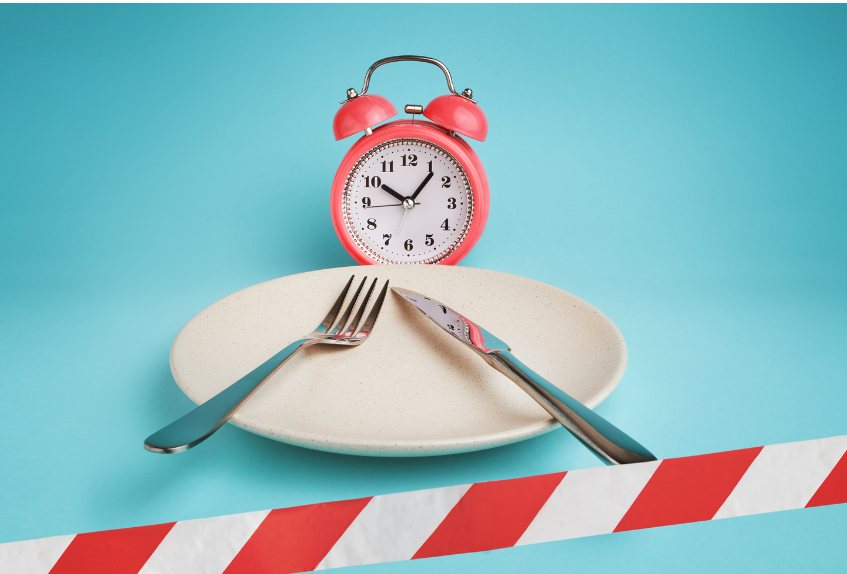Intermittent fasting is amazing for maintaining brain health.
Yes – we all have waste in the brain and this form of restricted eating – actually “takes out the trash” that builds up during the day.
This self-cleaning process helps detoxify the brain, clear out old and damaged cells, improves memory, and reduces inflammation.
And, if you want to lose fat, improve metabolism, and experience other health benefits all without giving up your favorite foods, intermittent fasting might be for you!
Sounds too good to be true…lol.
It’s the when of eating and not the what. It’s controlling when you eat and drink, as opposed to what you eat and drink.
I used to fast years back and stopped doing it. But with all the talk of the benefits of intermittent fasting, I gave it a try about 5 years ago. And I continue to go back to incorporating this into my ageless wellness lifestyle by doing it once or twice a week. It’s very beneficial.
Intermittent Fasting Meaning…
You eat, but in a shorter window of time. Some people call it time-restricted fasting (TRF).
There are lots of ways to intermittently fast. It can be done daily, weekly, or monthly.
Intermittent fasting is just that – fasting intermittently (periodically). It’s an “eating pattern,” rather than a “diet.”
I’d say that women should proceed with caution on fasting and especially boomer women as myself. That is why I practice and suggest the 16-8 method. And occasionally do the 14-10 method.
The 16 – 8 hours Intermittent Fast (IF) is when you consume no food for 16 hours and eat normally during the other 8 hours.
Try it one day a week. When you’re ready, then kick it up a notch to two times a week. Presently, I alter between once to twice a week. It works well with my schedule and my bodily reactions.
You may be wondering if fasting intermittently will lead to an increase of what you eat during those times when you go back to eating. And that’s a great question. It didn’t for me. I find that I do not feel compelled to overeat.
Disclaimer
Before I go any further – please make this health decision based on your own unique needs. When necessary, speak with your medical doctor regarding this fasting option. If you’re under 16 years of age, pregnant, nursing, or of ill-health then I don’t recommend this fasting style.
How To IF
This is what I do and why it works for me.
I’ve been in the world of health foods and nutrition forever. I’ve experienced what foods work for me in terms of energy, weight gain, and ethics. And yet the amount of information that we are faced with daily in terms of the marketing of food trends, diets, what to eat or not – well, it’s staggering.
I already use this intermittent fasting in my ageless wellness toolkit. It gets my stamp of approval!
It’s a system that is easier to stick with for most people. It’s not restrictive. You basically are giving up one meal. Or a snack. Or eating an early dinner.
There are so many potential benefits – cellular clean-up, hunger reset, weight loss.
16 – 8 IF = The latest bias on intermittent fasting– has people skipping breakfasts and eating at noon, 1, or 2pm. I prefer to stop eating the other way – stop in the late afternoon, early evening. As a result you go to sleep and wake up and can eat a breakfast. Stop food at 4:30 or 5:00pm and only drink water or tea until bed. 16 hours passes, and you break the fast then at 8:30am or 9:00am the next day. Done.
14 – 10 IF = Stop eating at 6pm and start at 8am the next day. Easy peasy.
Intermittent fasting (IF) benefits are more than regular calorie reduced diets and it also has a metabolic advantage. These are excellent things when it comes to long-term health.
I do feel my stomach shrinks a bit and when I eat after the fast, I am not at all ravenous. This feels quite good.
Benefits of Intermittent Fasting…it can
- Reduce inflammation
- Improve heart health
- Speed fat loss
- Slow down or reverse aging process
- Improve mood and memory
- Reboot the immune system
- Good for cognitive health
- Improve mental health
- Lowers risk of developing a chronic disease
- Help with weight loss

The Biology Behind IF
A wonderful intermittent fasting benefit is that it promotes autophagy. This is the process your body undergoes to clean out damaged cells and generate new ones. It’s a cellular self-cleansing process. Our aging simply stated is, the accumulation of damage. As we age, we can no longer recycle damage so easily. Thereby increasing the rate of cellular clearance is a great avenue to slow down aging.
Glycogen, a type of energy, is created from the breakdown of carbohydrates and gets converted to a sugar called glucose. When the body doesn’t need to use the glucose for energy, it stores it in the liver and muscles. After 12 hours with no food, your liver’s stores of glycogen are depleted, and your body taps into its fat cells for energy, says Mark Mattson, a senior investigator with the National Institutes of Health (NIH). This shift affects your cells and can trigger all sorts of beneficial adaptations.
Recently I watched the docuseries – Regain Your Brain. One of the excellent episodes featured David Perlmutter, M.D., F.A.C.N., a board-certified neurologist and member of the Board of Directors, of the American College of Nutrition, author. He said: “the longer we can extend the night time fast (skip breakfast) is good. Eat breakfast 5 days. Take a couple of days and have your first meal at noon or 2pm. Your body will thank you for that. And you’ll re-establish a connection with what it feels like to be hungry. It’s good to re-establish a signaling in your body that tells you it’s time to eat. As opposed to 3 meals a day. Miss a meal here and there. It’s good for you. It’s a low level of stress on your body called hormesis that’s actually good for you. It helps with longevity and brain preservation.”
There you have it. Most people are constantly eating and digesting – 3 meals a day – your system must work 24/7 to process everything.
Intermittent fasting is merely giving your body a break during a period of time so that it could really improve digestion as well as brain health in the longer term.
Takeaway
This is not a lose weight quick plan. It’s not a health fad promising that you’ll lose 7 lbs in 7 days.
You, the consumer do not purchase a thing! Huh? Well, thank goodness.
It’s all about the when. Looking at the when of your eating.
Consequently, be sure to know what results you’re looking for and understand the benefits of intermittent fasting.
I recorded a video overview on intermittent fasting. Head over to my YouTube channel (and please do subscribe) where I get up close and personal about my experiences with intermittent fasting. See you there!
Intermittent Fasting is one addition to your lifestyle for optimizing your brain health, more efficient digestion, and increased energy.
I WOULD BE HAPPY TO GUIDE YOU IN THIS AND OTHER WAYS TO LIVE AGELESSLY WELL!
LET’S CONNECT TODAY

